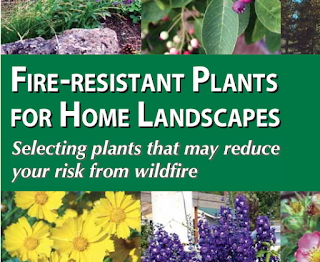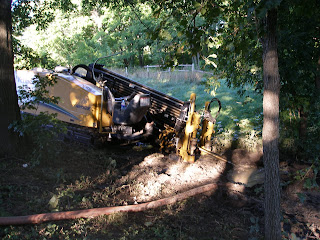FIRE - RESISTANT PLANTS FOR HOME LANDSCAPES
In dry forested areas, grassland, and areas prone to large fires, plants can be used to deter the forward velocity of the flames and reduce the amount of fuel available. A rich understory of living plants burn slower and keep moisture in the forest floor. Ground cover plants with watery sap burn slowly. Carpet Bugleweed, Kinnikinnick, and Rock Cress form dense mats of vegetation, protection of the soil with succulent leaves. Fire resistant perennials include Thyme, Yarrow, Chives, Columbine, and sedges. Shrubs include: Cranberry Cotoneaster, Boxwood, Dogwood, Russia Sage, and Serviceberry. Surprisingly two conifers, Ponderosa Pine and Western Larch are fire resistant, due to their thick bark and high moisture foliage. Many deciduous trees are fire resistant.
Fire-resistant does not mean fireproof.
Plants that are fire-resistant have the following characteristics:
• Leaves are moist and supple.
• Plants have little dead wood and tend not to accumulate dry, dead material within the plant.
• Sap is water-like and does not have a strong odor.
• Sap or resin materials are low.
Check out the original publication by the University of Oregon.
http://www.firefree.org/images/uploads/FIR_FireResPlants_07.pdf
http://www.firefree.org/images/uploads/FIR_FireResPlants_07.pdf
Groundcovers
Ajuga reptans Carpet bugleweed
Antennaria rosea Pink pussytoes
Arctostaphylos uva-ursi Kinnikinnick
Aubrieta deltoidea Rock cress
Ceanothus prostratus Mahala mat
Cerastium tomentosum Snow-in-summer
Delosperma cooperi Purple iceplant
Delosperma nubigenum Yellow iceplant
Dianthus species Dianthus, Garden carnation, or Pinks
Fragaria species Wild strawberry
Lamium species Dead nettle
Pachysandra terminalis Japanese pachysandra
Phlox subulata Creeping phlox
Sedum species Sedum or stonecrops
Sempervivum species Hens and chicks
Thymus praecox Creeping thyme
Veronica species Speedwell
Perennials
Achillea species Yarrow
Allium schoenoprasum Chives
Aquilegia species Columbine
Armeria maritima Sea thrift
Aurinia saxatilis Basket-of-gold
Bergenia cordifolia Heartleaf bergenia
Campsis radicans Trumpet vine
Carex species Sedges
Coreopsis species Coreopsis or Tickseed
Delphinium varieties Delphinium
Echinacea purpurea Conefl ower
Epilobium angustifolium Fireweed
Gaillardia varieties Blanket fl ower
Geranium cinereum Grayleaf cranesbill
Helianthemum nummularium Sun rose
Hemerocallis species Daylily
Heuchera sanguinea Coralbells
Hosta species Hosta lily
Iris hybrids Iris, tall bearded
Kniphofi a uvaria Torch lily or Red-hot poker
Lavandula species Lavender
Linum perenne Flax, blue
Lonicera species Honeysuckle
Lupinus varieties Lupine
Oenothera species Evening primrose
Papaver orientale Oriental poppy
Penstemon species Penstemon or Beardtongue
Ratibida columnifera Prairie conefl ower or Mexican hat
Salvia species Salvia or Sage
Stachys byzantina Lamb’s ear
Yucca species Yucca
Shrubs—broadleaf evergreen
Ceanothus gloriosus Point Reyes ceanothus
Cotoneaster apiculatus Cranberry cotoneaster
Cistus purpureus Orchid rockrose
Daphne x burkwoodii
var ‘Carol Mackie’ Carol
Mackie daphne
Gaultheria shallon Salal
Mahonia aquifolium Oregon grapeholly
Mahonia repens Creeping holly
Paxistima myrtifolia Oregon boxwood
Rhododendron macrophyllum Pacifi c rhododendron
Shrubs—deciduous
Acer circinatum Vine maple
Acer glabrum Rocky Mountain maple
Amelanchier species Serviceberry
Caryopteris x clandonensis Blue-mist spirea
Cornus sericea Redosier dogwood
Euonymus alatus ‘Compactus’ Dwarf burning bush
Holodiscus discolor Oceanspray
Perovskia atriplicifolia Russian sage
Philadelphus species Mockorange
Prunus besseyi Western sandcherry
Rhamnus frangula ‘Columnaris’ Tallhedge
Rhamnus frangula ‘Asplenifolia’ Fernleaf buckthorn
Rhododendron occidentale Western azalea
Rhus species Sumac
Ribes species Flowering currant
Rosa species Hardy shrub rose
Rosa woodsii Wood’s rose
Salix species Willow
Spiraea x bumalda Bumald spirea
Spiraea douglasii Western spirea
Symphoricarpos albus Snowberry
Syringa species Lilac
Viburnum trilobum Viburnum, Compact American
‘Compactum’ cranberry
Trees—conifer
Larix occidentalis Western larch
Pinus ponderosa Ponderosa pine
Trees—deciduous
Acer ginnala Amur maple
Acer macrophyllum Bigleaf maple
Acer rubrum Red maple
Aesculus hippocastanum Horsechestnut
Alnus rubra Red alder
Alnus tenuifolia Mountain alder
Betula species Birch
Catalpa speciosa Western catalpa
Celtis occidentalis Common hackberry
Cercis canadensis Eastern redbud
Cornus fl orida Flowering dogwood
Crataegus species Hawthorn
Fagus sylvatica European beech
Fraxinus pennsylvanica Green ash
Fraxinus americana White ash
Gleditsia triacanthos
var inermis cvs
Thornless honeylocust
Gymnocladus dioicus Kentucky coffee tree
Juglans species Walnut
Liquidambar styracifl ua American sweetgum
Malus species Crabapple
Platanus racemosa Western or California sycamore
Populus tremuloides Quaking aspen
Prunus virginiana Chokecherry
Prunus virginiana ‘Schubert’ Canada red chokecherry
Quercus garryana Oregon white oak
Quercus palustris Pin oak
Quercus rubra Red oak
Robinia pseudoacacia
‘Purple Robe’ Purple Robe
locust
Sorbus aucuparia Mountain ash
PNW 590 • August 2006
Selecting plants that may reduce
your risk from wildfire
FIRE-RESISTANT PLANTS
FOR HOME LANDSCAPES
A Pacific Northwest Extension publication
Oregon State University • Washington State University • University of Idaho
Selecting plants that may reduce
your risk from wildfire
FIRE-RESISTANT PLANTS
FOR HOME LANDSCAPES
A Pacific Northwest Extension publication
Oregon State University • Washington State University • University of Idaho


Comments